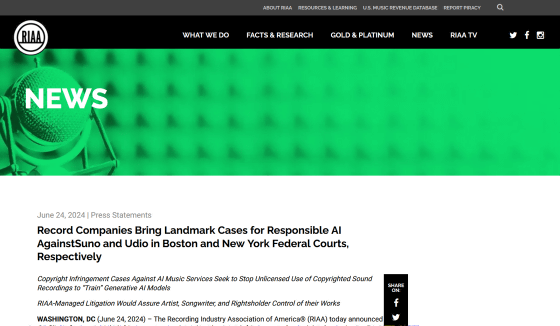Music-generating AI services 'Suno' and 'Udio' sued by major music companies such as Sony, Warner and Universal for copyright infringement

A group including
Record Companies Bring Landmark Cases for Responsible AI Against Suno and Udio in Boston and New York Federal Courts, Respectively - RIAA
https://www.riaa.com/record-companies-bring-landmark-cases-for-responsible-ai-againstsuno-and-audio-in-boston-and-new-york-federal-courts-respectively/

Major record labels sue AI company behind 'BBL Drizzy' - The Verge
https://www.theverge.com/2024/6/24/24184710/riaa-ai-lawsuit-suno-audio-copyright-umg-sony-warner
Suno and Udio, the targets of the lawsuit, are two of the most successful companies developing AI services that generate music using text prompts. Suno has partnered with Microsoft's AI assistant tool 'Copilot,' while Udio has attracted attention after its generated music was sampled in ' BBL Drizzy ,' a song released by famous hip-hop producer.
Meanwhile, major music companies coordinated by the RIAA have filed lawsuits against Suno and Udio for copyright infringement. The lawsuit against Suno (PDF file) was filed in federal court in Boston, and the lawsuit against Udio (PDF file) was filed in the U.S. District Court for the Southern District of New York.
In their lawsuit, the RIAA and major music companies claim that Suno and Udio have mass-produced and used copyrighted recordings without permission. The RIAA points out, 'It's clear what these services are trained on: they have mass-produced plaintiffs' copyrighted recordings and fed them into their AI models. These products work only by copying vast amounts of recordings by artists of all genres, styles, and eras. These services are not exempt from copyright law, which protects human copyright. Like other market participants, they may not reproduce copyrighted works for commercial purposes without permission.'
The lawsuit seeks damages of up to $150,000 for each copyrighted work that was infringed, along with legal costs.

The plaintiffs say that when they accused Suno of infringing their copyrighted material, the company evaded the allegations by claiming that the training data was 'confidential business information.' Udio has made similar claims, and the two companies are said to be trying to hide the fact that they were using music label copyrighted material without permission.
'If Suno et al. had taken the effort to refrain from copying Plaintiffs' recordings and incorporating them into their AI models, Suno's service would not have the quality it advertises and would not have been able to mimic such a wide range of human musical expression,' the lawsuit states.
'These are typical cases of copyright infringement involving the unauthorized copying of sound recordings on a large scale. Rather than putting their services on a sound, lawful footing, Suno and Udio are attempting to hide the full extent of their copyright infringement. These lawsuits are necessary to reinforce the most fundamental rules for the ethical, lawful and responsible development of generative AI systems and put an end to Suno and Udio's blatant infringing conduct,' said RIAA Chief Legal Officer Ken Doroshov.
In response to an inquiry from overseas media The Verge, Suno CEO Mikey Sharman claimed that the company's service does not copy and output existing content, but generates entirely new music, and does not allow user prompts based on specific artists. 'We would have gladly explained this to the label companies that filed the lawsuit, but instead of having a good-faith discussion, they reverted to their old lawyer-driven strategy. Suno is built for new music, new uses, and new musicians,' Sharman said.
The conflict between the music industry and generative AI companies is becoming increasingly intense, and in April 2024, more than 200 famous artists, including Billie Eilish and Stevie Wonder, signed a letter condemning 'predatory AI' that learns the music and singing voices of human artists and devalues them. In addition, Sony Music Group issued a statement in May prohibiting the use of content owned by its affiliates for AI learning purposes.
More than 200 celebrities, including Billie Eilish and Stevie Wonder, sign letter condemning 'predatory AI' that steals audio and replaces artists - GIGAZINE

The Verge commented, 'Much of the music generated by AI won't replace the work of human artists. But there are real concerns in the music industry and other creative industries that AI content could erode their ability to make money from their work.'
Related Posts:
in Note, Posted by log1h_ik






